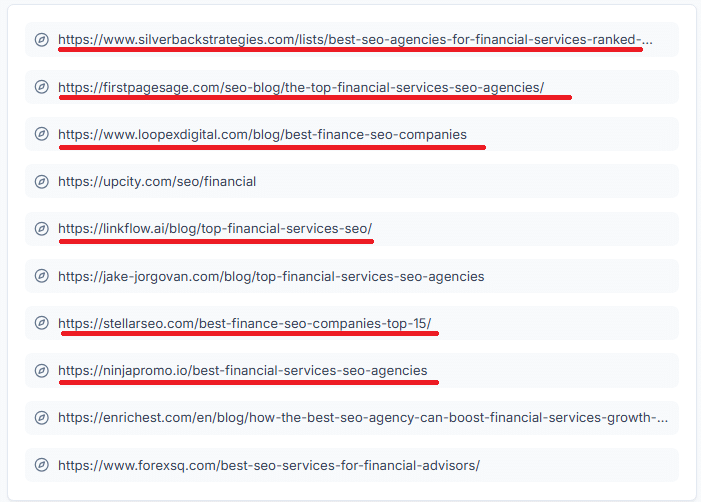If you’ve asked ChatGPT, Bing Copilot, or Perplexity for help finding the best SEO agency for financial advisors, the answers you received may have been influenced by content that wasn’t as objective as it seemed.
Behind the scenes, many of these AI-generated recommendations are shaped by articles that appear credible but are actually written by SEO agencies themselves, ranking themselves first on so-called “best of” lists. These pieces are rarely disclosed as promotional, offer no transparent methodology, and often exclude actual competitors.
Within the SEO industry, this tactic is well known. It works because list-style content is structured in a way that AI tools interpret as authoritative and useful.
And while you may not have seen the original article yourself, LLM tracking software shows that this content is influencing how large language models rank and recommend agencies, including in financial services.
These articles work so well that, in addition to “The Top Financial Services SEO Agencies: 2025,” at least one of our competitors wrote (and ranked themselves #1) for dozens of “Top SEO Agencies of 2025” posts – spanning everything from law firms to pest control to robotics… and many others.
The real risk: in AI search, it’s not just what you publish that matters – it’s what the models absorb and repeat, often without context or scrutiny.”
And while AI search is changing how people discover vendors, it should only be the starting point. It’s still up to the advisor to vet the recommendations, understand the source, and ask the right questions before making a decision.
The Listicle Tactic And Why Some Agencies Opt Out
So, what’s the issue with this strategy? Write a “Top SEO Agencies” list for a specific industry, rank yourself #1, and publish it on your own website.
It’s not illegal. It’s not even technically deceptive unless you present it as an independent resource without disclosure.
But when these lists show up in AI search results or featured snippets, they start to look like impartial recommendations, and that’s the problem.
These listicles are designed to check every technical box:
- Structured headers (Top 10, Ranked #1)
- Keyword-rich titles
- Optimized metadata
- Clear formatting for featured snippets and AI summarization
They’re tailor-made to look authoritative, not just to Google, but to AI models scanning for structured, informative content. And yes, it works.
Why Listicles Influence AI Search
Listicles are powerful not because they’re always accurate, but because they’re designed in a way that AI models recognize as useful. Structured headlines like “Top 10” or “Best of,” keyword-rich titles, and clearly formatted rankings make it easy for AI tools to digest the content and present it back as answers.
When AI systems like ChatGPT or Perplexity scan the web, they look for content that seems authoritative and well-organized. A self-published “Top SEO Agencies” list often checks those boxes, even if the underlying recommendation isn’t objective.
That means agencies that create their own rankings aren’t just influencing Google results; they’re shaping what shows up in AI-generated answers, too. Because AI usually blends multiple sources into a single recommendation, readers may never realize the suggestion started as a self-promotional list.
We’ve seen listicles influence large language models across ChatGPT, Perplexity, and Bing Copilot. These tools aren’t citing the lists directly, but they’re learning from them. They absorb the language, the rankings, the brand mentions, then surface those brands as “recommended” providers in their own AI-generated responses.
It’s a clever strategy, but one that raises important ethical questions. Not every agency takes this approach, but in an industry like financial services, where credibility is everything, these kinds of shortcuts can be risky.
How AI Search Amplifies the Problem
In traditional search, biased listicles can still rank, but readers can usually see the source, skim critically, and spot promotional intent. AI search is different. Tools like ChatGPT, Perplexity, and Bing Copilot synthesize information into a single answer, often without showing where it came from. That makes it harder to tell whether a recommendation is based on independent validation or if it’s simply content that was structured to look authoritative.
That’s where the danger lies.
When a self-authored “Top SEO Agencies” article is well-structured, keyword-optimized, and written in an authoritative tone, AI models are more likely to absorb and repeat it in their recommendations, even if the content is promotional or biased. And users rarely see the source behind the suggestion.
We’ve used LLM tracking tools to analyze how these listicles show up in generative search platforms. What we’ve found is clear: even when the list isn’t cited directly, it’s informing the AI’s choices. Agencies that wrote their own rankings are being surfaced by AI as “top picks,” not because of their track record, but because of their content format.
That may deliver short-term visibility, but it comes at the expense of long-term trust. And when visibility comes at the cost of transparency, it doesn’t serve the advisor. It serves the algorithm.
Real Example: When “Top SEO Agency” Lists May Be Misleading
For example, we’ve seen articles titled “The Top Financial Services SEO Agencies,” where the publisher ranked themselves #1 without disclosing authorship or methodology. These lists often follow the same pattern: no transparency, no independent validation, and no real competitors included. It’s not specialization; it’s a content strategy built for visibility, not objectivity.
And they’re not alone. Other agencies have adopted the same playbook: create “best of” rankings across multiple sectors, omit disclosure, and use that content to boost their own appearance in search and AI-generated answers. The difference now is scale because AI tools are amplifying these tactics faster and farther than ever before.
LLM tracking software confirms it: articles like these are influencing AI recommendations, even when users never see the original content.
The goal isn’t to single out one company; it’s to highlight practices that compromise transparency, regardless of who’s using them. In an industry where trust is everything, financial advisors deserve clarity so they can make confident decisions in an increasingly AI-shaped digital landscape.
What Real Credibility Looks Like in 2025
Visibility is easy to fake. Credibility isn’t.
In a world where AI tools shape first impressions and surface content based on structure, not substance, it’s more important than ever to know what real trust signals look like.
Here’s what sets a credible SEO agency apart from one gaming the system:
- Transparent authorship: You should know who created the content and why.
- Defined methodology: Credible comparisons explain how decisions were made.
- Real client outcomes: Tangible results like rankings, qualified leads, or AUM growth.
- Industry-specific expertise: Familiarity with financial planning, compliance, and client expectations.
- Educational content: Articles, guides, or podcasts that help advisors make informed decisions.
- Third-party recognition: Cited by reputable publications, advisor networks, or associations.
- AI adaptation: Ability to explain how they adjust strategies for Google SGE, ChatGPT, and Perplexity.
How to Tell If an AI Recommendation Is Influenced by Promotional Content
AI tools don’t always explain where their recommendations come from, but you can still investigate:
- Visit the agency’s website. Check if they’ve published “Top SEO Agencies for [Industry]” lists featuring themselves without disclosure.
- Compare AI recommendations with agency content. If they publish self-authored rankings, that may be what’s influencing AI.
- Look beyond the list. Search for case studies, testimonials, and measurable outcomes.
- Google the agency name + “top SEO list.” A pattern of self-authored rankings is a red flag.
- Check for third-party validation. Are they mentioned outside their own site?
Want a practical checklist for evaluating SEO partners? Read our guide on how to evaluate SEO agencies.
Our Commitment to Transparency
We’ve chosen not to rank ourselves on “top agency” lists. Not because we don’t believe in the value of our work, but because credibility has to be earned, not manufactured.
We don’t write listicles for multiple industries. We don’t quietly place ourselves first. And we don’t conflate content marketing with editorial authority.
We work exclusively with financial advisors. No ecommerce. No dental. No HVAC. Just financial services because we understand the language, the regulation, and the stakes.
Instead, we focus on visibility that’s built on trust:
- Educational content
- Measurable client outcomes
- Financial services expertise
- Transparent strategy and support
We make our content AI-discoverable, not manipulative. Because we don’t want to be chosen because we ranked ourselves. We want to be chosen because we earned your trust. Because financial advisors don’t just need visibility – they need visibility that’s backed by credibility.
Conclusion: Visibility Is Changing—Trust Shouldn’t
Search is evolving, and AI is reshaping how people discover and evaluate their options. That shift brings new risks and new responsibilities for any firm trying to build a digital presence.
Listicles written by agencies themselves, then echoed by AI models, may look like independent recommendations. However, they risk eroding the trust financial advisors rely on to make confident decisions.
AI might be changing how people get answers. But it hasn’t changed what really matters: credibility, clarity, and the willingness to earn trust.
Learn more about our SEO services for advisors or schedule an introductory meeting.
Brent is the Principal and founder of Advisor Rankings - a specialized SEO and AI search optimization agency dedicated to helping independent financial advisors strengthen authority, boost traffic, and attract high-quality leads online.
- Brent Carnduff



